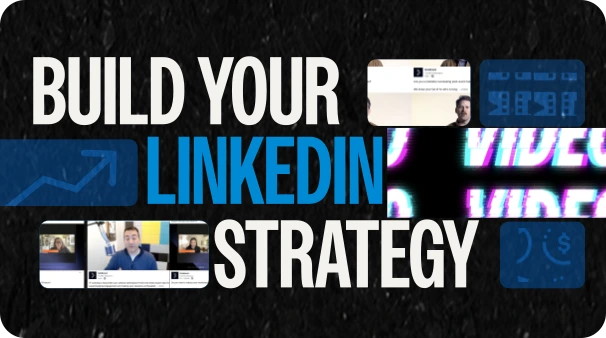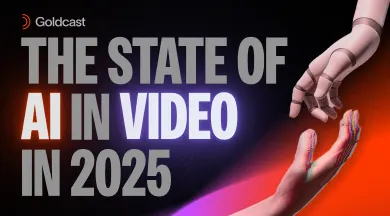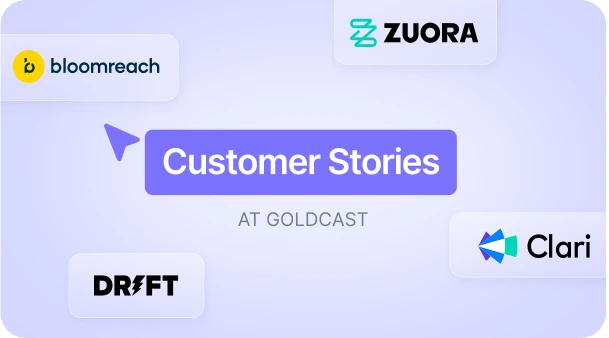9 Real Benefits of Podcasting for Business: Reach, ROI & More
Table of Contents
Maximize Your Marketing ROI
Join 10,000 other marketers already getting the best tips on running engaging events that boost pipeline and create raving fans.
These days no marketing strategy feels complete without a podcast. Everybody’s in on the game.
But will podcasts remain essential to tomorrow’s B2B marketing strategies, or will they shrink back to their home among true crime aficionados?
We’re convinced it’s the former. And since you’re here, we suspect you are, too. If you’re looking for details on all the benefits B2B podcasting has to offer, you’re in the right place. Ready? Let’s go.
Podcasts and B2B marketing: a match made in heaven
In the past decade, branded podcasts have gone from a fun experiment to a marketing staple with 1 in 3 B2B marketers incorporating podcasts into their strategies. But podcasting didn’t always have the widespread buy-in it has today.
Back in the 2010s, pioneers like Drift with its Seeking Wisdom podcast led the way in creating powerful business podcasts that shared thought leadership, industry insights, and success stories.
Later on, the integration of video cemented the rise of the B2B podcast as a viable—and valuable—marketing tool. The ability to easily produce and distribute video podcasts gave marketers the chance to take their interviews beyond audio content to create multimedia experiences that capture mindshare and drive business results.
9 benefits of podcasting for business
A successful podcast can bring both tangible and intangible value to your brand. Let’s take a look at nine major benefits of a B2B podcast.
1. Demand generation
In B2B, a podcast can yield short- and long-term benefits. It’s like planting a garden—some plants yield a harvest later that season, others take years to produce.
For example, if you’re just starting out, you could jump-start your exposure by having your podcast’s host appear as a guest on a more established podcast that appeals to your target audience. One relevant plug and, boom—you’ve got subscribers.
Over the long term, consistently producing valuable content helps build trust and brand authority within your industry. Case in point: The Customer Experience Podcast is produced by BombBomb, a pioneer in the personalized video space. Having published more than 250 episodes since 2019, BombBomb is playing the long game and it’s paid off. The brand is now top 10 in its category on G2.
So, what kind of timeline are you looking at in terms of results? For immediate awareness, you can see results with the first few episodes. During this initial period, it’s crucial to use all your marketing channels to promote your podcast’s launch and get the downloads flowing. Longer term, expect a year or more to establish a dedicated listener base and “thought leader” status.
We know what you’re thinking. It can be tough to continuously deliver high-quality content for a year with only modest results to show for it, but hang in there. Focus on staying hyper relevant to your target audience and strategically promoting your podcast.
2. Create brand recognition
Podcasts are a powerful platform for building brand recognition. They’re an opportunity to consistently get your brand and values in front of a loyal audience.
The latest Edison research revealed that 34% of Americans have listened to a podcast in the last week, and they listened to an average of eight episodes (!) during that week.
In other words, there’s plenty of potential for brand visibility among podcast listeners. By regularly publishing and delivering quality content, you can embed your brand into listeners’ routines and earn valuable mindshare.
3. Build reputation as industry experts
Podcasting is one of the best ways to position your brand as an industry thought leader. The long-form format lets you go beyond website copy and social media posts to showcase real-world experience and expertise.
Interviews with industry leaders, deep dives into trends, and unique insights from your internal SMEs’ are all part of building credibility with your podcast audience.
For example, professional services firm Deloitte has built a strong reputation in tech. The brand uses its podcast to demonstrate expertise in the emerging technology space. Most User Friendly listeners probably aren’t actively looking to hire a professional services firm. However, you can bet that those who do, down the road, will shortlist Deloitte.
4. Form a personal connection with your audience
Your podcast gives listeners an authentic way to engage with your brand—mainly because they aren’t really engaging with your brand at all. They’re hearing from the people behind your brand.
The conversational tone of a podcast helps listeners feel connected to your people, message, and values. It’s not transactional; it’s personal. You’re building a long-term relationship with listeners that’s grounded in consistency and authenticity.
“I think the thing that we’re really hungry for,” explains Rachel Elsts Downey, Founder and CEO of Share Your Genius, “is authentic human connection—and the number one way to connect somebody with somebody is through conversation. Podcast specifically is the channel to do that in a very authentic way.”
It’s hard to overstate the value of this personal connection: listeners trust podcast hosts for recommendations (80%) almost as much as they trust family and friends (84%).
5. Reach a wider audience
Podcasting opens the door to listeners who are less likely to engage with marketing content. With more than 100 million active listeners in the US, podcasting gives you access to a diverse, new audience that extends beyond traditional media consumers.
The unique audio format of a podcast is especially valuable for brands trying to reach busy, multitasking B2B buyers with limited time to consume written or video content. These folks can listen while commuting, exercising, or catching up on housework.
6. Fuel your content flywheel
When it comes to repurposing content for multichannel use, it just makes sense to start with long-form and break it down into shorter, tailored formats.
That’s why a podcast is the perfect foundation for your multimodal content strategy. You’re starting with long, expert discussions of topics that are directly relevant to your audience.
So, exactly can you repurpose your podcast? Let us count the ways:
- Videos
- SEO blog posts
- Show notes
- Audiograms
- Infographics
- Zero-click social posts
- Quote images
- Email campaigns
- Ebooks
Producing a podcast does take some work, but you can get a lot of value out of it with a little strategy. That said, repurposing podcast content isn’t just about, as Rachel puts it, a “peanut butter spread everywhere effort.” Instead, it’s about designing your podcast production process with repurposing and distribution in mind.
For example: While you’re recording with guests, take the opportunity to ask questions and capture content to use on all your channels, even if that content won’t make the final cut for the podcast episode.
💡 You don’t need a production engineer to repurpose your podcast into snackable videos, audiograms, and more. Goldcast’s AI-powered Content Lab simplifies the process. Upload your audio files and start repurposing for free right now.
7. Network within the podcasting ecosystem
Because podcast content leans educational, not promotional, it’s a great opportunity to collaborate with complementary brands in your industry. Joining a podcast network plugs you into a supportive community of fellow podcasters where you can:
- Build relationships
- Share strategies
- Cross-promote
- Source amazing guests
For instance, HubSpot’s podcast network includes more than a dozen shows catering to different niches in marketing. They all enjoy the perks listed above, as well as major visibility and credibility boosts from the HubSpot brand.
8. Explore sponsorship opportunities
Speaking of collaboration, sponsorships are another great way to expand your reach and create new revenue streams. Sponsorships go both ways in podcasting. You can:
- Sponsor another podcast with a larger or complementary audience to your own. This exposes your podcast to new listeners and comes with some built-in trust since it’s seen as an endorsement from the sponsored podcast’s host.
- Invite brands to sponsor your podcast to generate revenue and see some immediate return on investment.
Of course, as with any partnership, the key to successfully executing either of these strategies is discernment. Partner with relevant, trusted brands that align with your mission and bring value to your listeners. No amount of revenue is worth the reputational damage that comes with accepting sponsorship from an irrelevant brand.
9. Increase marketing ROI
Producing a high-quality podcast is an investment. There are ongoing costs for equipment, editing software, hosting platforms, and promotion. However, compared to other forms of media, podcasts are fairly cost-effective.
When you consider all the benefits of a branded podcast—demand gen, brand trust, expanded reach, collaborative partnerships, sponsorship revenue—it’s not hard to see why many companies find podcasts a worthwhile investment.
Plus, podcasting is fun—and listeners can tell
As content marketers, we understand that the “fun” scale of content creation is subjective. (Somebody out there probably loves writing technical whitepapers.) But come on, planning and producing a podcast has to be high on the fun-o-meter for most marketers.
And yes, your audience can tell when your host and guests are having fun with a discussion. It comes down to humanizing your brand with genuine conversations that entertain, inform, and build community.
Should “fun” be a podcasting KPI? Maybe not, but it certainly doesn’t hurt to generate ROI and have a good time doing it.
🤔 Troubleshooting: When brand building with your podcast isn’t driving demand
What if you’re not seeing tangible ROI after a year or more of running your own podcast? If you find that your podcast is widely recognized but not driving demand, consider these adjustments:
Content alignment
Like any content marketing initiative, a successful business podcast is built upon audience challenges and needs. Are your podcast topics directly relevant to your ideal potential customers? Or are you catering to a slightly different audience with your podcast—one that may not need your product or service?
CTAs
A branded B2B podcast typically isn’t meant to promote your products; it’s meant to educate your audience and build your brand. However, have you gone too far into non-promotional land? You should still integrate clear and compelling CTAs in your episodes, inviting listeners to further engage with your brand or product.
Engagement strategies
Are you simply broadcasting with your podcast, or are you fostering a sense of community? Encourage listeners to interact by inviting them to submit questions, chime in on social media, and participate in live Q&A sessions.
Distribution
Are you distributing your podcast on all the major platforms—Spotify, Apple Podcasts, Google Podcasts, and YouTube? Most podcast hosting platforms syndicate to all these for you, but it’s worth double checking. You should also make sure you’re including thoughtful episode descriptions that will help each new episode show up in podcast directories’ search engines.
Reap the benefits of a quality podcast with Goldcast
Podcasts are more than a trend. They’re a strategic asset for B2B marketers looking to boost brand awareness, establish thought leadership, and increase the efficiency of their content marketing programs.
Goldcast’s Recording Studio is designed specifically for B2B marketers. With our all-in-one platform, you can record, edit, publish, repurpose, and distribute your branded podcast. No tech stack to integrate. No professional producer required.
Want to see how Goldcast makes it easy to produce high-quality, on-brand content that drives results? Book a demo to see it in action, or create your free Content Lab account and try it today.
Stay In Touch
Platform
Resources
Company
Community
© 2025 Copyright Goldcast, Inc. All rights reserved.



 Upcoming Events
Upcoming Events Event Series
Event Series On-Demand Events
On-Demand Events

